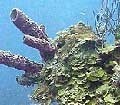Kelp can reduce level of hormone related to breast cancer risk
could help to fight hormone-related cancers, suggests new animal
research.
Researchers at the University of California, Berkeley have found that a diet containing kelp seaweed lowered levels of the most powerful female sex hormone, oestradiol, in rats.
Their findings raise hopes that it might decrease the risk of oestrogen-dependent diseases such as breast cancer in humans.
Breast cancer is the most common cancer among women across the European Union. Britain has one of the highest breast cancer death rates in the world, according to Breast Cancer Research, with one woman in nine developing the disease during her lifetime.
"This study opens up a new avenue for research leading to cancer preventive agents," said Martyn Smith, UC Berkeley professor of environmental health sciences and co-author of the study. "Kelp is a little studied nutrient but there's good reason to look at it more closely."
Like soy, the researchers originally became interested in kelp because of its high consumption in Japan and a potential link to the low rates of breast cancer there. Prior studies have shown that Japanese women have longer menstrual cycles and lower serum oestradiol levels than their Western counterparts, which is thought to contribute to their lower rates of breast, endometrial and ovarian cancers.
But scientists searching Asian diets for clues to the lower rates of cancer have mostly focused their attention on soy. The Berkley team say that their new results, published in the February issue of the Journal of Nutrition (135, pp296-300), could demonstrate that soy is not the only dietary component that protects against breast cancer.
"Brown kelp seaweed makes up more than 10 per cent of the Japanese diet," said Christine Skibola, lead author of the study. "Soy has gotten most of the attention, but our study suggests that kelp may also contribute to these reduced cancer rates among Japanese women."
Skibola initially gained encouraging results from supplementing two women with highly irregular menstrual cycles with 700mg of seaweed daily.
"It reduced much of the pain associated with endometriosis and significantly lengthened the total number of days of their menstrual cycles," she said.
For the new study, the researchers randomly divided 24 female rats into three groups. One group was fed a high daily dose of 70 milligrams of dried, powdered kelp for four weeks, while a second group was fed a low daily dose of 35 milligrams. Both groups were compared with a third control group of rats that did not receive kelp.
Researchers used bladderwrack seaweed (Fucus vesiculosus), the main form of kelp sold in the US and closely related to wakame and kombu, the brown seaweeds that are most commonly consumed in Japan. The doses given to rats were roughly equivalent to the amount of seaweed eaten by people in Japan.
The researchers report that the rats' menstrual cycles increased from an average of 4.3 to 5.4 days for the low dose kelp group, and to 5.9 days for the high dose kelp group. Overall, dietary kelp resulted in a 37 per cent increase in the length of the rat oestrous cycle.
Studies in humans have linked longer menstrual cycle lengths to lower risk of breast, ovarian and endometrial cancers.
"If you have longer cycles, you actually have fewer periods over a lifetime, which means less time is spent overall in the phases where hormone levels and breast and endometrial cell proliferation are at their highest," said Skibola.
During the early part of a woman's menstrual cycle, oestradiol levels remain relatively constant. Almost halfway through the cycle, oestradiol levels surge, peaking just before ovulation. These cyclic periods of high oestrogen stimulate the division of breast cells that already have DNA mutations, as well as increases the chances of developing new mutations, factors that may increase risk of breast cancer.
The study also tested the impact of dietary kelp on oestradiol levels, comparing them before supplementation and after. After just two weeks of eating 35 milligrams a day, oestradiol levels were reduced from an average of 48.9 nanograms per liter to 40.2 nanograms per liter. After four weeks, oestradiol levels dropped further to 36.7 nanograms per liter.
In a separate test of human ovarian cell cultures, dosing with kelp extract led to a 23 to 35 per cent decrease in oestradiol levels.
"One possibility is that the kelp may be acting as an oestrogen antagonist by preventing estradiol from binding with its oestrogen receptors," said Skibola. "Our next step is to try to isolate the active compound in kelp that is having this hormone-modulating effect."
She noted that seaweed contains several complex compounds, including polyphenols.
The researchers say they are working to isolate the active compounds in kelp that affect oestradiol levels to avoid the possible toxicity of the high levels of iodine and heavy metals in the plant.
"It's a study that points to the need for more studies," said Smith. "But this certainly suggests that there are other elements of the Asian diet beyond soy that should be explored."













